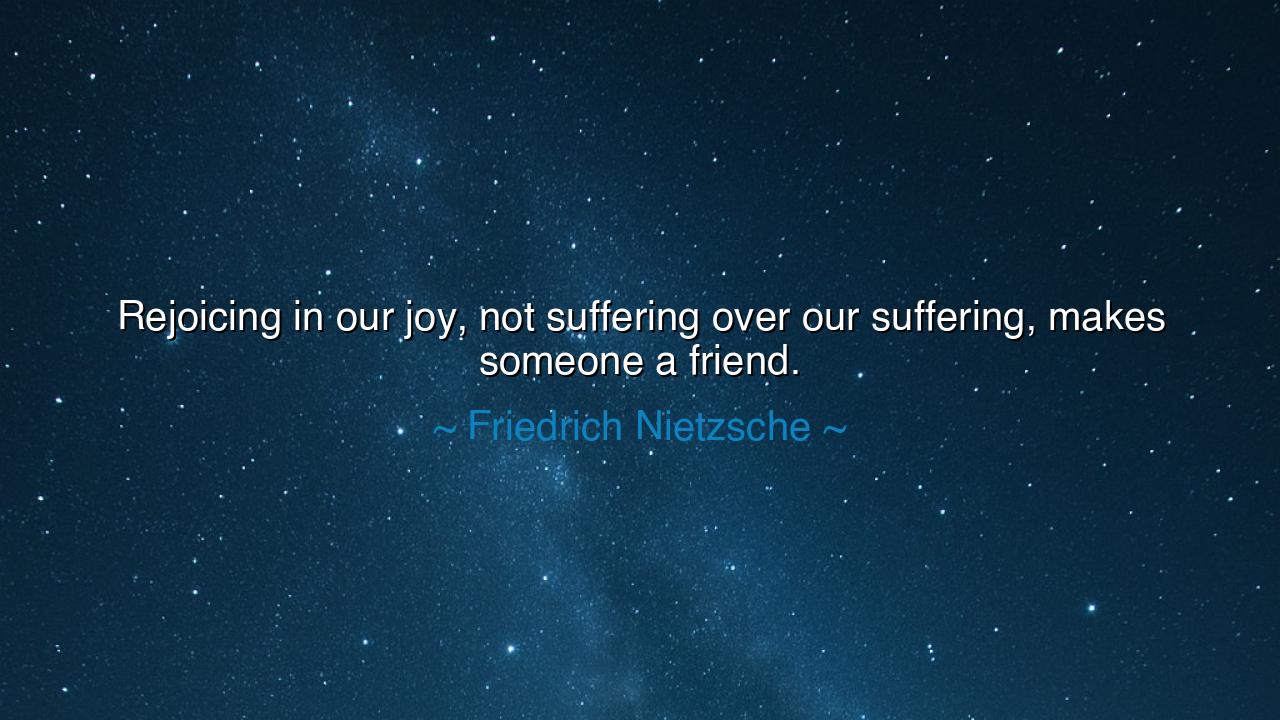
Rejoicing in our joy, not suffering over our suffering, makes






The words, “Rejoicing in our joy, not suffering over our suffering, makes someone a friend,” were written by Friedrich Nietzsche, the philosopher of depth and flame, who saw beyond the shadows of human comfort to the fierce truth of life. Though often remembered for his boldness and defiance, in this saying Nietzsche reveals a gentler wisdom: the nature of true friendship. For him, a friend is not one who merely pities our pain, but one who can rejoice in our joy—who celebrates our triumphs without envy, and delights in our light as if it were their own. In this single line, Nietzsche captures one of the hardest truths of the human heart: that to share in another’s happiness is rarer, and nobler, than to share in their sorrow.
To the ancients, friendship was a union of souls striving toward virtue, not merely a companionship of comfort. Yet even they knew how difficult it is to rejoice with a pure heart. Many can offer sympathy when you fall, for pity flatters their own strength; but few can look upon your rising and be glad without shadow. Nietzsche, who lived much of his life in solitude, understood that the test of friendship lies not in the storm but in the sunlight. It is easy to kneel beside a friend’s grave; it is harder to stand beside his throne without bitterness. Thus, he teaches us that the truest friend is one who rejoices when we rejoice, whose love is so generous that your joy becomes their own.
Consider the story of Michelangelo and Tommaso dei Cavalieri, the young Roman nobleman whom the aged artist loved and admired deeply. Michelangelo, already revered as one of the greatest minds of his age, found in Tommaso not a rival, but a reflection of youthful beauty and grace that reignited his creative spirit. When others might have been jealous, Tommaso rejoiced in Michelangelo’s genius, encouraging him without envy or pride. Their letters reveal affection founded not in pity or flattery, but in mutual exaltation—one soul rejoicing in the brilliance of another. Through their friendship, art itself was nourished, and the bond between them stands as proof of Nietzsche’s truth: the highest friendship is born from shared joy, not shared despair.
There is a subtle power in Nietzsche’s teaching. He does not dismiss compassion; he simply elevates joy as the truer bond. Pity, though noble in intention, often carries the poison of superiority. When we suffer with another, we feel noble for enduring their pain; but when we truly rejoice in another’s joy, we forget ourselves entirely. Such friendship demands purity of heart—the absence of envy, the death of comparison. The friend who rejoices in your success has conquered the ego; he no longer measures his worth against yours, but delights as though your victory were his own. This is friendship transformed into something divine.
Nietzsche himself suffered the loneliness of a thinker ahead of his time. His mind was aflame with ideas too vast for the world to understand, and yet he longed for friendship—not the shallow companionship of agreement, but the deep kinship of shared joy in truth and beauty. In this saying, he may have been speaking to his own longing—to find someone who could stand beside his intensity not with fear or pity, but with joyful recognition, one who could say, “Yes! I, too, see the same light.” Such a friend, he knew, is rare, but precious beyond measure.
Let this teaching, then, be a mirror for the soul. When you find yourself near another’s happiness, examine your heart. Do you rejoice sincerely, or does a shadow of comparison creep in? Do you celebrate your friend’s fortune as a blessing, or does it awaken your envy? The path of the noble heart is to rejoice wholly—to become as the sun, shining on another’s harvest without resentment, knowing that their abundance does not diminish your own. To do so is to practice the highest form of love: joy without possession, loyalty without dependence, admiration without desire.
So, my child, remember this ancient truth reborn in Nietzsche’s words: true friendship is tested not by sorrow, but by joy. Comforting the grieving is human; celebrating the blessed is divine. Be the friend who lifts others higher, who does not dim their light to make your own seem brighter. When others prosper, let your heart sing, for their joy adds to the world’s light—and you, too, are warmed by its flame. In doing this, you will not only find friendship; you will become its living embodiment—the kind of soul that turns envy into reverence, and solitude into the shared radiance of joy.






AAdministratorAdministrator
Welcome, honored guests. Please leave a comment, we will respond soon